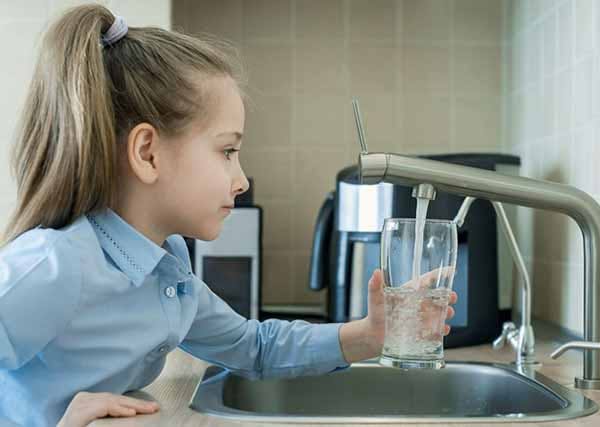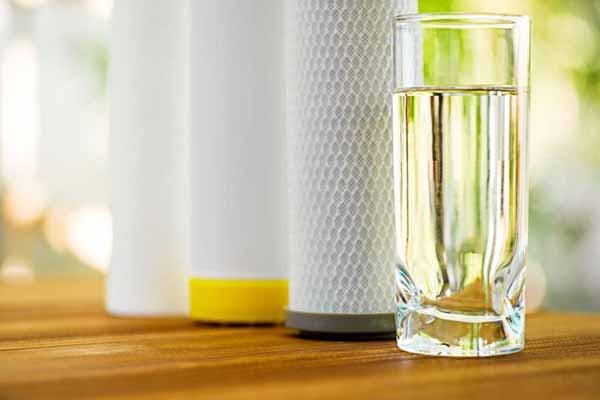🌟 New Arrival! Upgrade Your Water with Our Advanced Pitcher Filter. Shop Now
April 2022
Is Tap Water Safe to Drink? What You Need for a Healthy Home
Many folks wonder: Is tap water safe to drink? Some people feel tap water is just fine and can't imagine spending extra money on bottled water. In contrast, others think bottled water is a safer, cleaner alternative to tap water or well water, so they’re more willing to pay.
People sometimes opine that the water in their home or workplace has an unappealing flavor and worry about the contaminants that might be present — including those used to disinfect water. Many municipalities use chlorine to treat public water. Still, this disinfectant can cause some people to perceive that the water to have a funny aftertaste.
Is bottled water the better option despite the added cost? Or is it just slick marketing on the part of bottled water companies?
In this article, we're looking at how the U.S. regulates tap water and whether or not bottled water is the healthier, wiser choice. We're also discussing another option: home water filters. We'll cover why water is essential for your health and the best options for ensuring you get the clean water you need.
How Does the EPA Regulate Tap Water?
Water from your faucet is the most accessible source of hydration. But is tap water safe to drink? Read on to learn how the U.S. Environmental Protection Agency (EPA) enforces drinking water regulations in the U.S.
Federal laws have regulated tap water safety since 1974, when Congress passed the Safe Drinking Water Act. These laws set forth guidelines for drinking water, whether the source is groundwater like rivers or underground sources like aquifers. The EPA enforces drinking water standards for numerous chemical and microbial contaminants.
Your local water supplier must provide you with an annual Consumer Confidence Report. These water quality reports list the presence of specific contaminants and your tap water source. Some cities print their Consumer Confidence Reports in the local newspaper, while others mail them out to residents. Ask your water utility for a copy if you don't receive a report.
While most homes in the U.S. receive tap water from a municipal source, approximately 23 million households have private wells. The EPA doesn’t test or monitor well water. Homeowners with private wells must maintain their well water systems.
Is Tap Water Safe to Drink? Identifying Possible Contaminants
While we often associate the word "contaminant" with undesirable elements, the EPA takes a broader definition. The agency defines a contaminant as "any physical, chemical, biological, or radiological substance or matter" found in drinking water. In other words, "anything other than water molecules" is a tap water contaminant. The EPA has determined that some contaminants are safe at certain levels.
Common chemical contaminants that could make their way into tap water include pesticides, industrial runoff, and toxic metals like lead, mercury, and arsenic.
Biological contaminants are things like bacteria, viruses, and parasites.
Radiological contaminants can come from naturally occurring uranium or radium deposits in the ground and human-made nuclear waste.
All of these pollutants can enter our drinking water from various sources. For example, some chemicals and heavy metals occur naturally in the ground and rain can sweep bacteria and pesticides from agricultural sites into our water supply.
What Are the Health Risks of Drinking Polluted Tap Water?
Many people will recall the water crisis in Flint, Michigan. Due to a corrosive water source and a lack of oversight, the city's water supply had unsafe lead levels beginning in 2014. Lead exposure is dangerous for all individuals, but young children are especially at risk. The EPA and the CDC state that "there is no known safe level of lead in a child's blood." Lead exposure can cause lifelong difficulties such as a lower IQ, behavioral problems, and slow growth.
Unsafe drinking water should not be an issue in the United States. A public health crisis of such magnitude left many people across the country wondering, "Is my home's tap water safe to drink?"
Anytime you drink water it should be safe, clean H2O. But how do you know? At the very least, specific drinking water contaminants will make your water taste and smell bad. There are many "nuisance chemicals" that the EPA doesn’t have regulatory standards for. While these substances don’t pose a health risk, they can affect the drinking water supply's appearance, flavor, and odor.
In worse situations, contaminated water can severely risk your health and life. It can cause rashes, upset stomach, vomiting, and diarrhea. Water toxins can lead to reproductive problems, developmental disorders, and even cancer in more severe cases.
Children, infants, and pregnant women are especially vulnerable, as are individuals with special healthcare needs such as the elderly and anyone with a weakened immune system.
Why Is Clean Water Essential for Human Health?
You might survive over a month without food, but you'll only make it a few days without water. Drinking enough water is essential for your well-being. Every function in your body uses water, from your heart beating to your eyes blinking.
Drinking water is vital for healthy digestion, temperature regulation, and even breathing.
Our bodies lose water when we breathe, sweat, and urinate. We can quickly become dehydrated if we don't replace this lost water. Even mild dehydration can cause ill health effects like headaches, dry mouth, and decreased urination.
Most of us don't drink enough water throughout the day. There are numerous recommendations on how much water we should drink, but we each have unique hydration needs.
The standard guideline of eight 8-ounce glasses a day is easy to remember, especially if you don't already drink much water. But unless you’re on a fluid-restricted diet, you can drink as much water as you'd like. The key is to stave off thirst and keep your hydration levels up. You’ll need to drink more water if it's hot out, you're physically active, and when you experience vomiting or diarrhea.
Is Bottled Water the Answer?
Considering the potential dangers of tap water, some people have turned to bottled water. But is this really the best option for drinking water?
The answer is no. According to the Centers for Disease Control and Prevention (CDC), there’s no hard evidence that bottled water is safer than tap water. Commercially bottled water still has the potential to become contaminated during sourcing and throughout the bottling process.
You could be surprised to learn where some bottled water comes from. The label might have a picture of a serene mountain vista, but the water inside could easily be from the "local water supply" you're trying to avoid. In other words, the water has passed through the same water treatment facility as your tap water. The only difference is that the bottled version sometimes comes at a much higher cost.
The Best Option? A Home Water Filter
What’s the right thing to do if tap water or well water may have contaminants and bottled water is overpriced? Installing a high-quality home water filter is the safest, healthiest, most eco-friendly, and least expensive option. A water filtration system for your home might cost a little more upfront, but once installed, you'll enjoy the benefits of cheap, clean water for many years.
An under sink or whole home filtration system allows you to drink tap water without waiting. Unlike water filter pitchers, these systems give you clean, crisp water on demand.
Home Water offers several water filter choices to improve your quality of life. Check out our top-rated EZChange Water Filter and experience the joy of clean, delicious water from the convenience of your kitchen or bathroom tap.
What Are the Benefits of Filtered Water?
Filtering your home's tap water or well water offers several advantages over bottled water. Let’s examine a few.
Removes Contaminants
A high-quality water filter will remove chlorine, lead, arsenic, mercury, VOCs, waterborne pathogens, and other toxins that might be found in tap water. The end product is pure, clean-tasting water.
Improves Health
You won't drink water that doesn't taste or look good. Drinking more water improves hydration and your overall health. You get only the cleanest, purest water for your body by filtering your water.
Makes Food Taste Better
If you cook with unfiltered water, the unpleasant taste will still be present in your food or beverages. Cooking with pure, filtered water will preserve the flavor of your soups, stews, rice, and pasta. Once you make your tea or coffee with filtered water, you'll notice the difference in drinking water quality.
Protects the Environment
Every year, individuals carelessly discard millions of plastic water bottles. They eventually end up sitting in a landfill or polluting our oceans. Around 80% of all marine debris is plastic waste. Getting water straight from your tap and drinking from reusable water bottles is eco-friendly.
Saves Money
Bottled water is expensive, but tap water is almost free for most people in the developed world. Depending on your local water utility charges, you could be paying as much as 2,000 times more for bottled water! In many municipalities, tap water is less than a penny per gallon. Skip the plastic bottles and enjoy cold, clear, inexpensive water in your home.
Convenience
If you've ever shopped for bottled water, you know how heavy those jugs and cases are. A home filter means you don't have to go to the store for water. Delicious water is as close as your faucet.
How Do I Get Started With a Home Water Filter?
HomeWater offers two water filtration options: under counter water filters and whole home filters. Under counter options (also called under sink filters) are discreet and easy to install. They’re the perfect choice for renters who want clean water but can't install a whole home system. Homeowners and families will enjoy the convenience of whole home filters. With Home Water, there's a water filter solution for every budget and lifestyle.
Brought to you by homewater.com
All images licensed from Adobe Stock.
Featured Image

